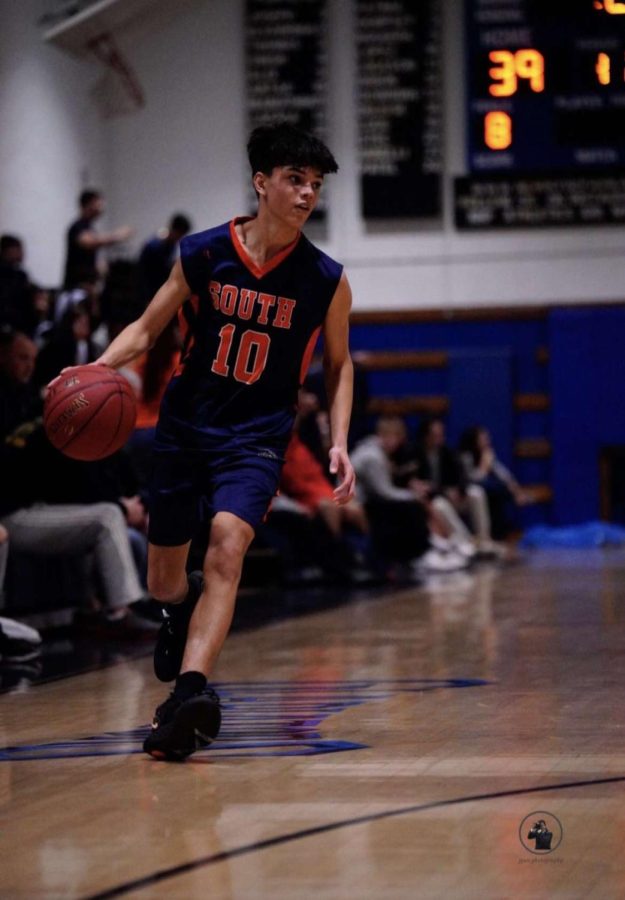
By Annie Zhang
Wolfgang Amadeus Mozart did it in The Marriage of Figaro, the opera performed last year at South. Georges Bizet did it in the opera chosen this year, Carmen. Both composers set their operas in a location that, according to four-year opera participant senior Giovanni Xu, “composers seemed to be obsessed with”: Seville, Spain.
While Carmen is set in Spain, Bizet, a French composer who took inspiration from a French novella, wrote the opera in (you guessed it) French. Since South prides itself in being the only public high school in the country to put on an annual full-scale opera in the original language, students who perform in the opera must learn to sing in French with a French accent. However, the performers don’t just learn French for the sake of a school tradition. They use the original language to authenticate their characters’ performances.
As both singers and actors, the opera performers need to learn the difficult French accent along with the already challenging musical score in just a matter of six months. During that period, students are encouraged to practice as often as possible and take advantage of all the resources available, which means consulting an International Phonetic Alphabet guide, getting pronunciation and musical guidance from various professionals, and rehearsing with South’s director of vocal music, Dr. Pamela Levy.
Many performers spend any chance they have going over the libretto, the text of an opera, and French diction with Dr. Levy. During those sessions, Dr. Levy said, “[Students] first need to understand what they are singing about and where it fits in the story.” Understanding the librettist’s and composer’s intents when singing makes fully conveying the story easier. According to Xu, “The language along with the music is how we as actors and singers express our characters’ emotions.” In addition, student performers who know what they are saying instead of just memorizing sounds can actually memorize their lines more efficiently.
Even though Dr. Levy’s assistance and pronunciation guides greatly aid the development of students’ French singing accent, some also seek guidance from experts on French diction. Sophomore Patrick Shen, a two-year participant of the opera, said, “I plan to go to my private vocal teacher or even the school French teacher for help on my diction.” Many students seek further assistance to perfect their French accent, paying attention to the slight differences between the ways English and French words are pronounced. Mrs. Mary Ann Schwartz, South’s French teacher, explained, “There are some nasal sounds, and that’s what makes it a little difficult. There are sounds in French that don’t exist in English. If you are trying to mimic the sounds of French, the best thing you can do is listen to French music.”
In fact, the French-speaking accent also sometimes differs from the French-singing accent, according to junior Noah Harouche, a third-year opera participant. He explained, “Though the words are French, opera isn’t sung in the exact accent because some words just wouldn’t sound good that way.” Opera singers have the opportunity to take some small liberties. Harouche continued, “Mainly, the pronunciation of r’s is altered, but it should still be close enough to the language so that it’s understandable.” After all, the goal is to make the opera sound as authentically French as possible.
However, since an opera is essentially a play set to classical music, students also need to learn the music that accompanies their parts. According to Dr. Levy, “Because this opera is so musically challenging, students really have to study the score, know how to count, and be aware of the orchestra part.” Being mindful of the music and the orchestra’s conductor also helps in terms of accuracy so performers don’t miss entrances. The performers also rehearse the music during the school day, weekends, and vacations so often that their chances of messing up during the actual performance are greatly decreased.
Even though classical music in a foreign language is undoubtedly difficult to master and takes a lot of dedication, it’s what attracted some to opera in the first place. Xu explained, “The length opera singers have to go to create the art form makes it so much more satisfying for the performer. When it’s opening night and you’re on stage singing, you remember why you signed up in the first place.”
That the opera is so challenging and that people work so diligently on it make the performance all the more fulfilling. While the foreign language aspect adds to the difficulty of the already challenging music, Harouche said, “Singing the opera in its original language is also incredibly doable if the time is put into it.”
Although Carmen is sung in French, it still appeals to many people because opera can move people, transform people, make people fall in love. After Xu immersed himself in opera during his freshman year, he fell in love with it. He said, “Opera stays with you forever. I think the fact that I plan on going to college for vocal performance is a testament to the transformative power of this art form.” Although “opera” literally means “work” in Italian, when you love something, according to Xu, “it never feels like too much work.”


